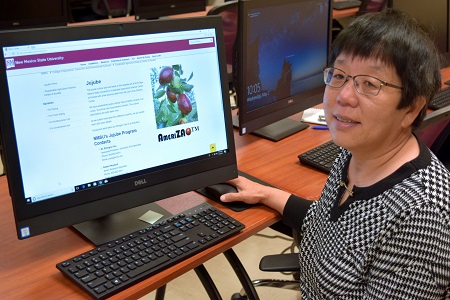 New Mexico State University Extension fruit specialist Shengrui Yao demonstrates a website that features 48 jujube varieties, including 34 cultivars recently trademarked as AmeriZao, which have been propagated and tested by Yao. (NMSU photo by Jane Moorman)WRITER: Jane Moorman, 505-249-0527, jmoorman@nmsu.edu
New Mexico State University Extension fruit specialist Shengrui Yao demonstrates a website that features 48 jujube varieties, including 34 cultivars recently trademarked as AmeriZao, which have been propagated and tested by Yao. (NMSU photo by Jane Moorman)WRITER: Jane Moorman, 505-249-0527, jmoorman@nmsu.edu
ALCALDE – AmeriZao is the new trademarked name for jujube fruit trees tested by New Mexico State University's College of Agricultural, Consumer and Environmental Sciences.
"Since these cultivars are originally from China, where Zao is the word for this fruit, I wanted to keep the traditional name in the trademark," said Shengrui Yao, NMSU Extension fruit specialist. "AmeriZao cultivars are American jujubes since they have been propagated and tested in New Mexico."
The 34 varieties receiving the new trademark are those propagated from cultivars Yao received from China in 2011. She has studied each cultivar for traits that will thrive in New Mexico's various climate zones. Gradually, she will publish the top performers in each region and for different purposes.
"Jujube fruit trees are an excellent alternative fruit for growers in northern New Mexico," Yao said. "The trees bloom from late May to early June, so late frosts will not prevent fruit from setting. They also do well in semi-arid conditions."
Yao has discovered that jujube trees, also known as Chinese dates, already exist around the state, but owners are often not aware what type of tree it is, or how to use the fruit. She has collected fruit from various locations, plus those raised in her study, for annual fruit-tasting events.
"People really like the different flavors that each cultivar offers," she said. "They are excited about having the fruit in their diet."
To help people learn more about each cultivar, Yao and NMSU's media production department have developed a website that features photos of each cultivar and information about the plant and its fruit.
"When you search the Internet for information about the jujube fruit, there are not many high quality photos," Yao said. "Our website has photos I have taken of each cultivar during my research."
Yao hopes the NMSU website at aces.nmsu.edu/jujube will help people identify the cultivar of jujube they may currently own, or help growers select cultivars in the future.
"Occasionally, plants bought from retailers are mislabeled, or a person discovers a jujube tree on their property from previous owners. This website allows them to compare their tree's fruit with the photo to see what cultivar they have," she said.
The photographs are grouped according to the best use of the varieties – drying, fresh eating, multipurpose or ornamental.
"People have different desires for using the fruit," Yao said. "They can look for the variety that matches their intended use of the fruit."
Yao has continued to propagate the cultivars but does not have the facility or staff to produce the plants for retail sale.
"The next step for providing these trees for commercial fruit growers is to partner with nurseries to produce the quantity necessary for that size of market," she said.